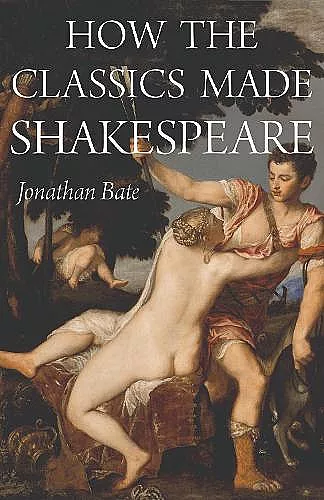How the Classics Made Shakespeare
Exploring the impact of classical literature on Shakespeare
Format:Hardback
Publisher:Princeton University Press
Published:22nd Mar '19
£18.00 was £20.00
Available to order, but very limited on stock - if we have issues obtaining a copy, we will let you know.
This hardback is available in another edition too:
- Paperback£15.99was £15.99(9780691210148)

This insightful exploration examines how classical literature profoundly influenced Shakespeare's creativity and writing style, as detailed in How the Classics Made Shakespeare.
This book originated from the first E. H. Gombrich Lectures in the Classical Tradition, delivered in the autumn of 2013 at the Warburg Institute, University of London. Titled Ancient Strength: Shakespeare and the Classical Tradition, it explores the profound impact of classical literature on Shakespeare's work. Jonathan Bate, a renowned literary critic and biographer, delves into how the Greek and Roman classics shaped Shakespeare’s imagination and his writing style.
Contrary to Ben Jonson's famous quip about Shakespeare's limited knowledge of Latin and Greek, Bate argues that Shakespeare was, in fact, deeply influenced by classical texts. His education in Roman literature and history, combined with the cultural environment of London—modeled after ancient Rome—provided a rich backdrop for his creative development. Bate highlights Shakespeare's engagement with classical authors like Ovid, Virgil, and Seneca, revealing how these works informed his plays and poetry.
At the core of How the Classics Made Shakespeare is the assertion that Shakespeare’s appreciation for the power of imagination was significantly influenced by classical traditions. Bate offers fresh interpretations of various plays and poems, linking them to classical myths, politics, and rhetoric. The book concludes with a compelling discussion on Shakespeare's lasting legacy, illustrating how he has become a modern classic, similar to the role the Greek and Roman classics played in his own time.
"[In this] amazingly erudite new study . . . Jonathan Bate shows that this process of repurposing old stories has always been the point of Shakespeare."---Daniel Swift, The Spectator
"[How the Classics Made Shakespeare is] frequently exquisite."---Elizabeth Winkler, Wall Street Journal
"How the Classics Made Shakespeare deserves an accolade too seldom awarded to academic works: Besides being eminently readable, it proffers illuminating observations and facts on every page."---Michael Dirda, Washington Post
"Jonathan Bate does not disappoint. . . . An absolute tour de force, a scholar non pareil, in every regard."---Ian Lipke, Queensland Reviewers Collective
"His scholarship is impeccable, his writing clear and vibrant. The study is a real delight, never ponderous, wonderfully insightful."---Alan Dent, Penniless Press
"Bate well reminds us that the survival of the classical world he has explored is under an even greater threat, as its literature and history recede from our educational curricula. We have even smaller Latin and even less Greek."---Paul Dean, The New Criterion
"At his best, Bate is utterly enthralling . . . . [How the Classics Made Shakespeare] is a wonderful, enlightening read."---Chris Tudor, Argo
"Bate is excellent at discussing text and context, Shakespeare and his contemporaries as well as the classics. Bate’s style is elegant, his learning informative, and his book rich beyond what a review can tell."---Jonathan Locke Hart, Renaissance & Reformation
"Discussions of classical influence on Shakespeare have generally looked at specific quotes, references, and allusions. By contrast, in this thorough study notable Shakespeare scholar Jonathan Bate takes a different approach: he considers the influence of classical works on the Elizabethan mindset, arguing that one must consider the indirect, as well as the direct, influences of the classics on Shakespeare’s work and on its reception by an Elizabethan audience. The author ably demonstrates that looking at the indirect influences enables one to appreciate the profound influence of the classical tradition (particularly Ovid) not only on Shakespeare but on the broader Elizabethan understanding of the world. Having detailed the influence of the classical on Shakespeare, Bate then traces a similar dynamic for Shakespeare’s influence on contemporary readers. Smoothly paced—thanks to compact, well-focused chapters—this fascinating work is eminently readable. It offers new readings of Shakespeare’s works and new ways of thinking about the influence of literary tradition, and it provides deep contextualization with broad and well-supported references to classical and early modern works."---L. S. Stanavage, Choice Reviews
"In a book as vigorous and often delightful as How the Classics Made Shakespeare, this should make any scholar – or perhaps just the ‘original’ ones – raise an eyebrow."---Micha Lazarus, Translations and Literature
"How the Classics Made Shakespeare is the most comprehensive, detailed, and eloquent treatment of the topic by a single author we have . . . no one . . . has revealed so much about Shakespeare and the classics altogether as Bate . . . . [A] charming book."---Scott F. Crider, Moreana
"Jonathan Bate’s luminous study presents Shakespeare anew as a Renaissance writer. . . . The classics, Bate argues, made Shakespeare sexy . . . Shakespeareans of every kind will read this book with profit and pleasure."---David Quint, Renaissance Quarterly
ISBN: 9780691161600
Dimensions: unknown
Weight: unknown
384 pages